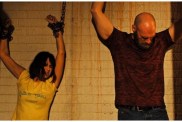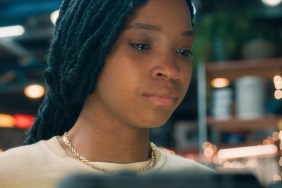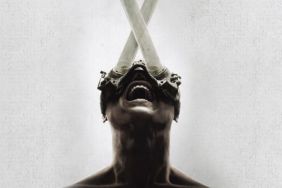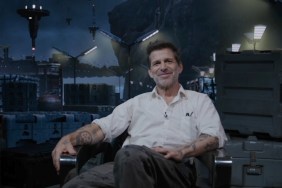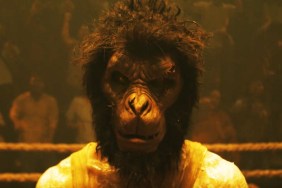
Over this past weekend Fox Searchlight released 127 Hours, Danny Boyle’s follow-up to the Oscar Best Picture-winning Slumdog Millionaire, into four theaters. The same day as its release I spoke with Boyle after first seeing the film at the Toronto International Film Festival earlier this year (read my review) and enjoying it so much I made sure to catch it again before chatting with him.
Already declared an Oscar front-runner and receiving glorious reviews from every corner of the globe, 127 Hours jumped out of the starting gates this weekend with the second best per-theater average of 2010 and will expand nationwide over the coming weeks (see the release schedule here). The film is based on the true story of mountain climber Aron Ralston (played impeccably by James Franco) and what happens after a boulder crashes down on his arm, trapping him in an isolated canyon in Utah. In my “A+” review I had this to say:
It’s a weird feeling to stare glassy-eyed at the screen and feel an absolute sense of awe at what you’re watching. 127 Hours wore me out and at the end I wasn’t making any immediate move for the exit. It’s reassuring when you see great filmmakers making great films and staying clear from the ordinary. To think Boyle and co-writer Simon Beaufoy were able to deliver such an emotional ride out of such a seemingly small story is movie magic at its best.
The film is truly a marvel as it utilizes all of your senses to the best of its ability. It’s a bona fide cinematic experience and to have the opportunity to sit down with Boyle after chatting with him for nearly 20 minutes the night before was truly enjoyable and I hope you find some interesting bits from our discussion.
On top of talking about 127 Hours, I also asked him about his upcoming projects such as the potential 28 Months Later and Trainspotting 2 sequels, why he dropped out of directing the My Fair Lady remake, his favorite film of all-time and much, much more. I did my best to leave no stone unturned and think I managed quite a revealing interview.
NOTE: Depending on how much you know about the story of Aron Ralston you may consider some aspects of this interview to be spoilers. Personally, I think you can know every detail of this story and it won’t affect your viewing of the film (it didn’t for me either time). I mention this only as a word of caution for those of you that have chosen to avoid any story details. With that said… let’s begin…
(All of my questions are formatted in bold and italic text.)

You’ve said in the past you expected your next film to focus on the story of a woman, and yet here is 127 Hours — not about a woman.
Danny Boyle (DB): I know, it proves the point really. I’m increasingly conscious of it. I’ve never done a film where a woman is the heartbeat of the film, drives the film. Absolutely. And it’s terrible — really bad — and I do see that.
I did [an interview for a] book and the person said to me, ‘How would you criticize yourself as a director?’ I think that would be the most significant one. I see that as a serious short-coming and I’m going to try to address that at some point. Yeah.
So do you see this as a general problem in film nowadays?
DB: Well of course, it’s a very male-dominated industry and we’re ignoring half the sky in a way. We’re not only ignoring [women], it’s not just a question of that. It’s not like some kind of radical religious sect ignoring women or reducing women to jackals or whatever, but it’s using them as tools to illustrate how half the sky isn’t women. I do think it’s a big issue, and not just because they’re women.
Kathryn Bigelow has it right. Journalists who come in and say, ‘What’s it like being a woman directing a movie?’ It’s like, Guys, how many times do you go in and ask a guy, ‘What’s it like being a guy directing a movie?’ So she’s right, she doesn’t want to evangelize about it, she just wants to work. She has a perspective on life and you may share that, you may not, and she illustrates it brilliantly.
We need more women for sure. There are riches we are yet to discover because we haven’t used women enough, or they haven’t succeeded enough in the industry, we have not discovered those riches as yet.
I know you were looking at a remake of
DB: It was that as well as I’ve always wanted to do a musical and it’s a great musical. There are some great songs in that film. The problem with the film for me was that I couldn’t cast Higgins [played by Rex Harrison in the 1964 adaptation]. Higgins is very difficult part to do because of the age difference. So he mustn’t become creepy, but it’s a very important age difference. He’s obviously a misogynist in many ways, and yet he’s charming. So it’s very, very difficult. It’s a wonderful script by Emma Thompson. It inhabits the original, it stays in period, but it’s actually a wonderful revitalizing of it.
Are you still looking for a musical, because with 127 Hours and Slumdog Millionaire you don’t need to be a film critic or aficionado to realize the music is a major aspect of your films, driving them in a way. There is a passion for music there. Like this film, such as the inclusion of the Bill Withers song and then the song at the end when he’s coming out of the canyon… what is that by the way?
DB: Sigur Rós “Festival” [listen to the right]
Perfect song! There comes a point near the end where you’re just like —
DB: Yeah, what are we going to do now!? That was a big thing because in reality, in the story, he hikes for four hours to get to those Dutch people. Four hours! And we tried that, we did shoot it. Like he has various adventures along the way to break it up, like finding new water sources and things like that.
In the book he has this terrible episode with diarrhea. [Cringes] I think we probably had enough by that point… The arm’s one thing, but following it up with some major diarrhea issues… It’s extraordinary to read, but then in addition to that we also had an ending, which was much more dialogue based. After he recovered in the hospital [there was a scene where] he met his mom, he went to his sister’s wedding and he went back to the girlfriend.
Did you film all of this?
DB: We filmed all those three scenes and they’re very good scenes, but they’re very conventional. You realize how unconventional the film is when you [include] these conventional scenes, which in their own right are delicious scenes — beautifully acted, very touching, completion, proper kind of closure. [It just] didn’t work at all. You can’t bare it.
I remember James [Franco] saying to me, [holding his chest] he said to me continually, ‘You know when that helicopter lands this movie is over. You can play those scenes, but you’ll not be able to sustain them.’ He said, ‘The feeling you want to get out of here is like you’ve got to get out and just somehow be able to talk to someone about the movie. You won’t be able to sit there for 15 minutes watching more of it.’
Watching it in Toronto I got glassy eyed right near the end and I don’t typically get that way in movies. The music rises and just overcomes you as you watch the montage of his life afterwards. The second time I watched it, he’s already out and the music is playing and I’m starting to ask myself, “When did I get glassy-eyed watching this?”
DB: [Laughing]
And it’s right when those hikers turn and the music rises and it just hits you. I’ve seen it twice now and the moment didn’t change, even though I was looking for it and when it happened it was like, “There it is!” To add more would lessen the effect. It would do what too many movies do nowadays, where they feel they have to add —
DB: They keep going on, and on, and on… I know.
Dialogue free…
DB: I know, and that’s what someone said to me. They came and saw a very early cut and they said, ‘That ending, you spend the whole fucking evening with no dialogue and then you put three fucking scenes at the end and there’s all this dialogue. Don’t you realize how wrong that is? It’s wrong for the movie. It’s too conventional and it’s an unconventional film, go with it.’
What was the name of the camera you said you used when we were talking last night?

DB: It’s called a Silicon Imaging 2K (more info), we call it an SI-2K.
So you’re shooting in digital, does that change the way you edit a film in any way?
DB: Only in the sense that you don’t wait for it to come back from the labs. You don’t wait a day for it to be processed and come back from the labs. But no, what effects editing what you’ve physically shot and in this case we shot very, very long takes. Like James experiencing the real time attempts to move the rock, rig the pulley or drink the water and his relationship with the water. Then we’d have a twenty minute take of James doing it and the editor, John Harris, would pick out like three sections of it, or ten bits of it in three sections and that would be the sequence then.
What he did, because James was experiencing it live like that, when we cut it all together it gives a sense of progression. It keeps the thing moving and it stops it being too technical. Because the danger of something like this is it becomes very technical because it’s so bitty. Instead what we did, because James is so brilliant, is he was able to conquer the demands of [the character] in each scene that he had to do. He could remember them all and do them all in one take.
So you got the adrenaline of the performance like in a theater piece and yet you’ve got the precision of film editing that allows you to go tick, tick, tick, tick, tick, and suddenly you’re in the first night. And then it’s tick, tick, tick, tick, tick through the night.
That’s one of the things that struck me the first time I saw the jump cuts in Godard’s Breathless.
DB: It must have been amazing when he released that film.
All-time favorite of mine.
DB: Can you imagine seeing it at the time? It must have just been like, “What?”
127 Hours is your second film with Simon Beaufoy writing the script and is he writing, or has written the
DB: I was hoping to persuade him to write “Maximum City.” He tried to, but it didn’t work. We’ve kind of given the rights back to the writer, [Suketu Mehta]. I’d love to work with that writer still, and Simon of course, but not at the moment no. We are still involved in India in working on a couple of projects, but not “Maximum City.”
Yeah, I read you’re doing something with Shekar Kapur.
DB: Yeah, Shekar Kapur who did the two Elizabeth films. He’s developing a script called Paani, which means “water”, and it’s about the importance of water in the future and it’s set in a futuristic world, which is partly Mumbai, partly Blade Runner kind of thing. He’s developing that at the moment and if all goes well I’ll help him [from a producer’s capacity] helping to set the film up.
So that wasn’t something you were ever looking to direct.
DB: No, that’s Shekar’s project and I’ll help him if I can.
I’m also involved in a film with a wonderful Indian filmmaker named Anurag Kashyap, he’s a very big talent I think. Not as well-known as Shekar. We’re trying to set up a trilogy with him, set in Mumbai and I would love to direct one of those, but it’s up to him. They’re his stories and he may not let me, he may want to do the whole trilogy.
Well you’re also very busy right now outside of films. You’re organizing the opening ceremony for the 2012 London Olympics, can you talk about that?
DB: Yeah, we’re working on it at the moment and the first deadline we have to meet is we show it in March of next year. You show your ideas to the International Olympic Committee and there’s all the politics to go through because this is a huge thing, but I’m very proud of doing it. The stadium is like a mile from my house. It’s a very rundown area of London that’s being invested in, long overdue and much deserved and I’m a big sports fanatic. I love sports, virtually all of it, probably with the exception of baseball, which I can’t quite follow.
Right there with you. Too slow, although I will say it’s perfect to have on in the background while writing because there’s little excitement and little going on.
DB: Yeah, for so long. [Laughing]

We were talking last night and brought up
DB: Yes, Trainspotting will definitely happen I think. That’s only my opinion, obviously there’s a lot of people involved. My opinion is that you just know when that film will happen at some point.
I was reading up on the literary sequel, “Porno,” by Irvine Welsh and saw it’s set 10 years in the future, but then reading around the Internet you’ve said you want to set it 20 years after the first film, which means you still have time.
DB: Yeah, because ten years you don’t even notice with actors. They can literally impersonate themselves. You could tell the difference, but you can’t really, 20 years you should be able to. So that’s the idea, they need to be significantly — because the danger is you’ll hit the same note again and it’ll be tragic really, whereas I think with something like that has such resonance for people. I think you need to use it really imaginatively so you’ll stimulate people and what you’re doing with it. The purpose of doing it is not just cashing in on something that’s a valuable property. You’re moving it around.
This is what I find fascinating about your interest in continuing the 28 Days franchise with

DB: When we did the first one, Alex [Garland], who wrote it, and I disagreed really. He’s a zombie aficionado, he knows it like he’s done a course on it. He just knows it. I just can’t be bothered and that made it a good combination. That was a very, very good combination — the two of us like that. Then on the second one [28 Weeks Later] I wasn’t that involved with it because I was doing Sunshine, but I watched it as a punter and that was really good for me.
Sometimes, well always when you’re involved in films, you never get to see them like punters see them. You’re always removed from people. You’re delighted if they’re enjoying it, you’re worried if they’re not, but you’re always removed. But I saw [28 Months Later] and I thought, I really see what people enjoy about this now. And I said I’d love to do another one, and I would.
And is Alex writing the script?
DB: No, but there’s an idea for it.
Something about the infection going to Russia is what I read.
DB: Well, that was uh … [laughing] I don’t want to follow that too much at the moment because it kind of leaked out and I’m not quite sure where anybody got that from, but yeah there’s an idea about it, which is really interesting. And again, because it’s a franchise it would have something to contribute [to the overall story].
So do you have a film in mind that you’re going to tackle next or is it just the Olympics and the London stage play of “Frankenstein”?
DB: I’m committed to those two and, in theory, they will take me up to July 2012, Christian [Colson] and I are developing a number of ideas so we’ll see.
I had one reader asking if you’d discuss some of your favorite movies.
DB: Well, there’s always a top one. Apocalypse Now is always number one. Always, every day in every way. Always.
Why’s that?
DB: So many reasons and the reasons continue to increase. It’s 31-years-old and yet, when you watch it, you never say, ‘Despite its age…’ It’s one of those films, there are very few of them, where people usually say, ‘Despite its age it’s timeless.’ You never even say that about Apocalypse Now. It’s the most amazing movie. It’s the ultimate action movie because it’s a journey and every time it stops there’s an immense, horrific, moral, physical crisis and that is an amazing structure for a film. Absolutely astonishing.
So that’s always my number one and then the problem is which Pixar films do you pick to fill out the next four places. My vote goes for Up, just for the cone of shame.
You see Toy Story 3?
DB: Yes, it’s just brilliant. It’s unbelievable, we did a screening [of 127 Hours] at Pixar and Lee [Unkrich] kind of did a Q&A with us afterwards, which is very lovely of him and I said to him, ‘The movie is just astonishing.’ That he can make you feel like that. It’s genuinely moving, truly moving.
So there you have it, be sure to look out for when 127 Hours is coming to your town and if you want my full opinion on the film, be sure to read my review. For more information on 127 Hours including a complete cast listing, pictures and more click here.
